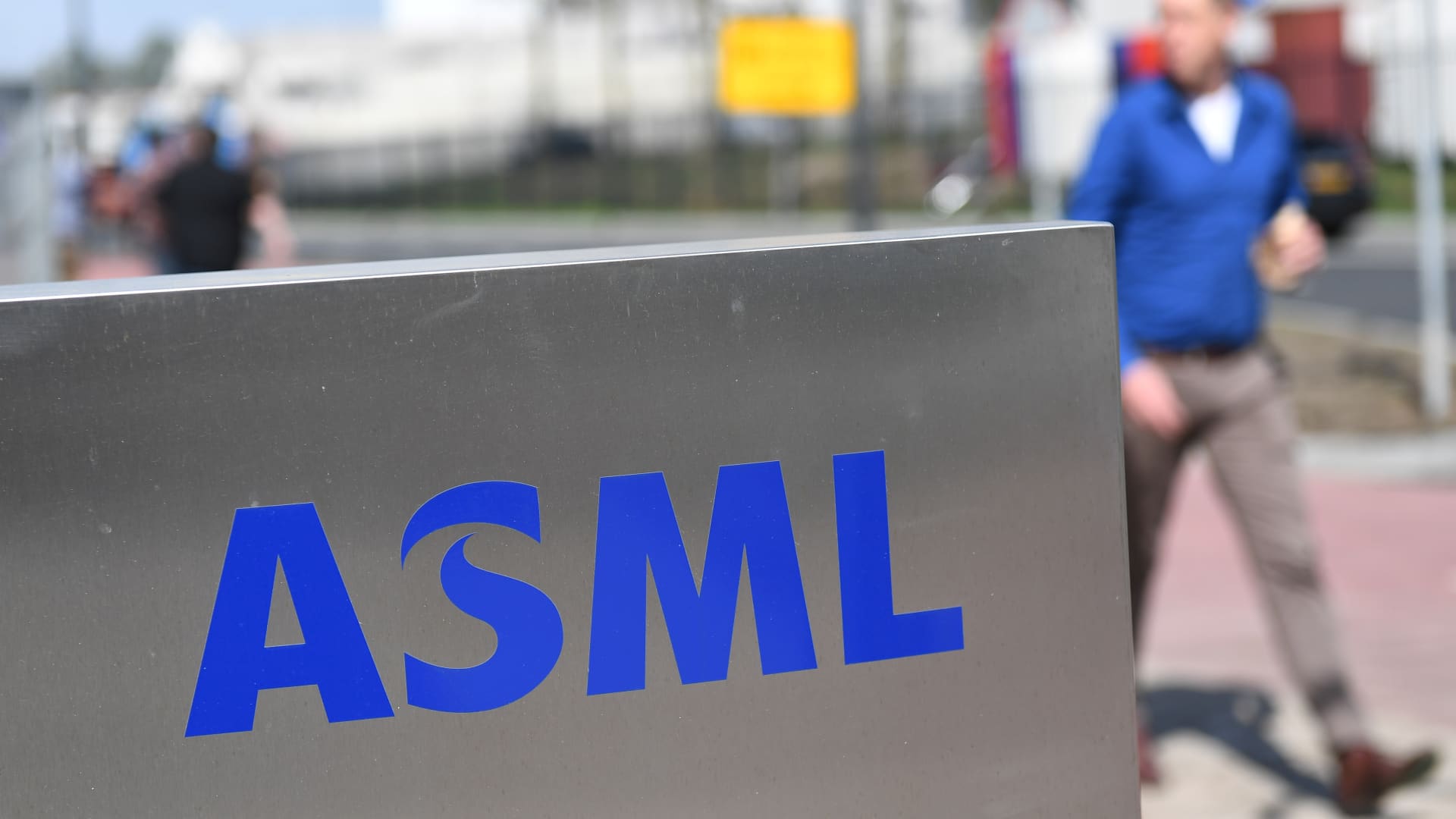ASML says ex-China employee misappropriated data relating to its critical chip technology

Dutch firm ASML makes one of the most important pieces of machinery required to manufacture the most advanced chips in the world. U.S. chip curbs have left companies, including ASML, scrambling to figure out what the rules mean in practice.
Emmanuel Dunand | AFP | Getty Images
ASML, one of the world’s most critical semiconductor firms, said Wednesday that it recently discovered that a former employee in China had misappropriated data related to its proprietary technology.
The Dutch firm said that it does not believe the alleged misappropriation is material to its business.
“We have experienced unauthorized misappropriation of data relating to proprietary technology by a (now) former employee in China,” ASML said in its annual report.
“However, as a result of the security incident, certain export control regulations may have been violated. ASML has therefore reported the incident to relevant authorities.”
The data that was misappropriated involved documents. ASML did not expand on the details.
The security incident comes at a sensitive time for ASML and the government of the Netherlands which has been caught in the middle of a battle for tech supremacy between the U.S. and China. Semiconductors are very much part of that rivalry.
ASML holds a unique position in the chip supply chain. The company makes a tool called an extreme ultraviolet lithography machine that is required to make the most advanced semiconductors, such as those manufactured by TSMC. ASML is the only company in the world that produces this piece of kit.
The U.S. is worried that if ASML ships the machines to China, chipmakers in the country could begin to manufacture the most advanced semiconductors in the world, which have extensive military and advanced artificial intelligence applications.
Since 2018, the U.S. has reportedly put pressure on the Dutch government to stop ASML shipping EUV machines to China. ASML has never shipped the tool to China.
Last month, Bloomberg reported that the U.S. reached an agreement with Japan and the Netherlands to restrict exports of advanced chipmaking machinery to China.
ASML said the agreement could cover its advanced chipmaking tools but it does not expect the measures to have a material effect on its 2023 expectations.
“We understand that steps have been taken that would cover advanced lithography tools as well as other types of equipment. The terms of this agreement have not been publicly disclosed and remain confidential for now. We expect that it will take many months for the governments to write and enact new rules,” ASML said Wednesday.
Liesje Schreinemacher, the Dutch minister for foreign trade and development cooperation, said ASML has informed the government about the incident and that an investigation is now under way.
“ASML works extremely hard to safeguard the security of its valuable technology. That is in everyone’s interest. It is therefore a major concern that such a large, renowned company has been the target of economic espionage,” Schreinemacher said in a statement on Wednesday.
“This shows once again how important it is to protect the Netherlands’ high-value technology.”
China espionage allegations
The latest report of data misappropriation in China is not the first incident that ASML has alleged that it has experienced.
In 2021, the ASML alleged a company called Dongfang Jingyuan Electron “was actively marketing products in China that could potentially infringe on ASML’s IP rights.”
ASML alleges that Dongfang Jingyuan Electron is associated with XTAL Inc., a company against which ASML had obtained a damage award for trade secret misappropriation in 2019 in the U.S.
Donfang Jingyuan Electron has denied reports about intellectual property theft.
ASML said in a separate statement Wednesday that it is seeing an increased number of attempts from actors trying to steal its technology.
“With ASML’s unique position and the growing geopolitical tensions in the semiconductor industry, we see increasing security risk trends, ranging from ransomware and phishing attacks to attempts to acquire intellectual property or disrupt business continuity,” a spokesperson said.
China meanwhile is trying to boost its own semiconductor industry against a backdrop of rising tension with the U.S. But China’s chip capabilities remain far behind the likes of the Taiwan, South Korea and the U.S.
China does not have any companies that can produce the tools that ASML does. Without ASML’s machinery, it will be difficult for China to manufacture the most advanced chips. Meanwhile, the U.S. introduced sweeping export restrictions in October aimed at cutting China off from obtaining or manufacturing key chips and components. Experts previously told CNBC that these factors would likely hobble China’s drive to boost its domestic chip industry.
– CNBC’s Silvia Amaro contributed to this report.









